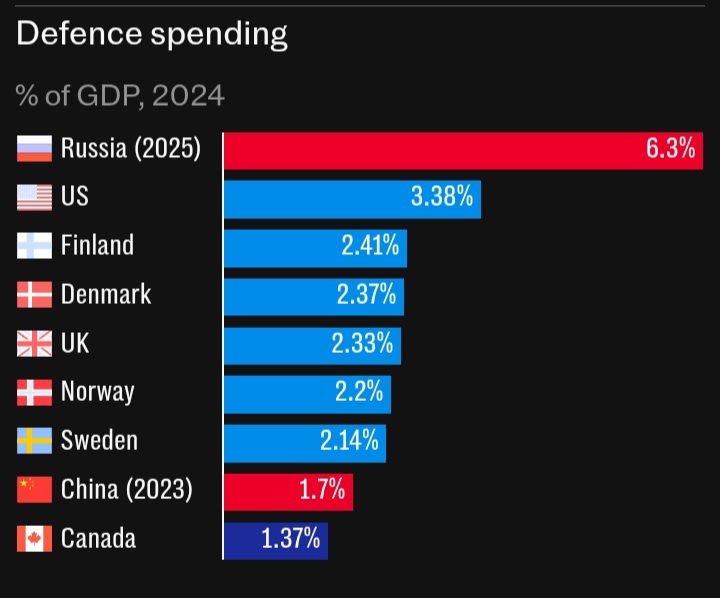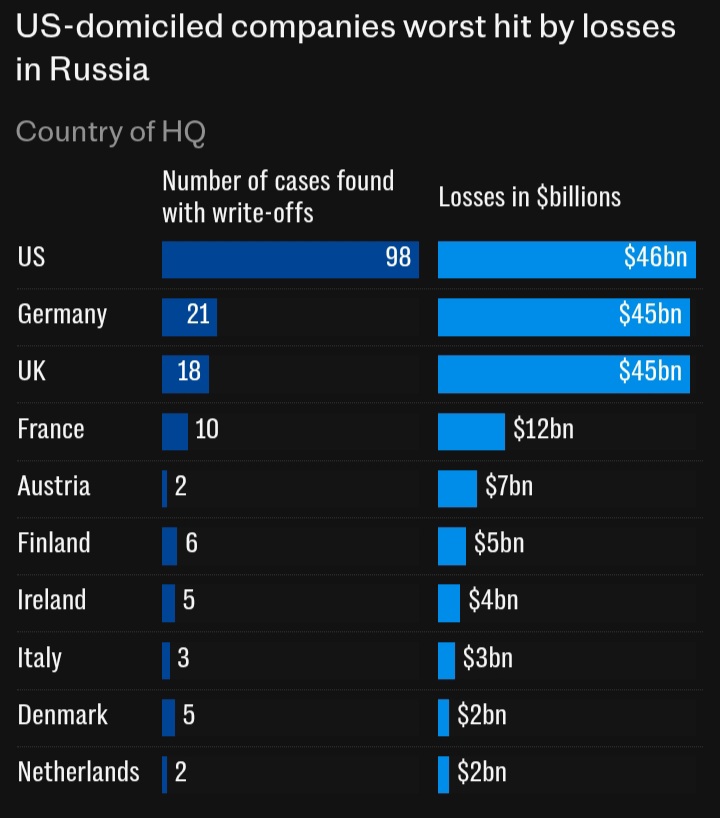With all these issues building, 2027 is viewed as the moment of maximum danger.
“The worst case scenario is that all these crises all overlap in 2027,” he explains.
Note: A reader forwarded a link of this timely article and I wanted to share it with the readers. Perhaps, we should consider the topics discussed and see how we can apply some of the solutions to our personal lives.
________________
Britain’s biggest companies are preparing for a third world war

As various conflicts threaten to erupt, bosses are taking steps to ensure their businesses survive
The year is 2027 and a major global conflict has erupted. Perhaps China has launched an attempted invasion of Taiwan, or Russian forces have crossed into the territory of an eastern European Nato country.
Whatever the case, Justin Crump’s job is to advise big companies on how to respond. And with tensions rising, a growing number of chief executives have got him on speed dial.
The former Army tank commander, who now runs intelligence and security consultancy Sibylline, says his clients range from a top British supermarket chain to Silicon Valley technology giants.
They are all drawing up plans to keep running during wartime, and Crump is surprisingly blunt about their reasoning: a global conflict may be just two years away.
“We’re in a world which is more dangerous, more volatile than anything we’ve seen since the Second World War,” he explains. There are lots of crises that can happen, that are ready to go.
“Chief executives want to test against the war scenario, because they think it’s credible. They want to make sure their business can get through that environment.”
The year of worst case scenarios
He rattles off a series of smouldering international issues – any one of which could ignite the global tinderbox – from Iran’s nuclear ambitions, to China’s threats to Taiwan, to Vladimir Putin’s designs on a Russian sphere of influence in Ukraine and beyond, as well as Donald Trump’s disdain for the post-1940s “rules-based international order”. Against this backdrop, planning for war is not alarmist but sensible, Crump contends.
With all these issues building, 2027 is viewed as the moment of maximum danger.
“The worst case scenario is that all these crises all overlap in 2027,” he explains.
“You’ve got the US midterms, which will have taken place just at the start of that year, and whatever happens there will be lots of upset people. It’s also the time when a lot of the economic disruption that’s happening now will have really washed through the system, so we’ll be feeling the effects of that. And it’s also too early for the change in defence posture to have really meant anything in Europe.”
Putin and Xi Jinping, the president of China, are acutely aware of all this, he says, and may conclude that they should act before the US and Europe are more fully rearmed in 2030. “In their minds now, the clock is ticking,” he adds.
He also points to major British and Nato military exercises scheduled to take place in 2027, with American forces working to a 2027 readiness target as well.
“There’s a reason they’re doing it that year – because they think we have to be ready by then,” Crump says. “So why shouldn’t businesses also work off the same thinking and plan for the same thing?”
He is not alone in arguing that society needs to start expecting the unexpected.
In 2020, the Government established the National Preparedness Commission to ensure the UK was “significantly better prepared” for the likes of floods, power outages, cyber attacks or wars.
It has urged households to keep at least three days’ worth of food and water stockpiled, along with other essential items such as a wind-up torch, portable power bank, a portable radio, spare batteries, hand sanitiser and a first aid kit.
“In recent years a series of high-impact events have demonstrated how easily our established way of life can be disrupted by major events,” the commission’s website says – pointing to the coronavirus pandemic, recent African coups, Russia’s invasion of Ukraine and turmoil in the Middle East.
Britain is also secretly preparing for a direct military attack by Russia amid fears that it is not ready for war. Officials have been asked to update 20-year-old contingency plans that would put the country on a war footing after threats of attack by the Kremlin.
All of this has led major businesses to conclude that perma crisis is the new normal, Crump says.
In the case of Ukraine, Western sanctions on Russia forced companies to choose between continuing to operate heavily-constrained operations in Russia, selling up, or walking away entirely.
Crump recalls speaking to several clients including a major energy company in the run-up to Russia’s invasion of Ukraine in February 2022.
He and his colleagues urged the business to evacuate their staff, at a point when it was still received wisdom that Putin wouldn’t dare follow through with his threats.
“I had almighty arguments with some people in the run-up, because I was very firmly of the view, based on our data and insights, that the Russians were not only invading, but they were going for the whole country. But other people in our sector were saying, ‘No, it’s all a bluff’.
“Their team came to me afterwards and said: ‘After that call, we were convinced, and we got our people out’. They got a lot of grief for that at the time, from people who were saying it was all nonsense.
“But then on the day of the invasion, they told me they got so many calls actually saying ‘thank you for getting us out’.”
Yet even in Ukraine, much of which remains an active war zone, life must go on – along with business.
“I’ve been to plenty of war zones,” says Crump. “And people are still getting on with their lives, there’s still stuff in supermarkets, and things are being made in factories – but that certainly all gets a lot more difficult.”
In the case of a major British supermarket, how might executives plan for, say, a Chinese invasion of Taiwan?
The first question is how involved the UK expects to be, says Crump. But if Britain, as might be expected, sides with the US at least in diplomatic terms, “we’re not buying anything from China”.
That immediately has implications for a company’s supply chains – are there any parts of the supply chain that would be crippled without Chinese products?
But as the recent cyber attack on Marks & Spencer has demonstrated, attacks on critical digital infrastructure are also a major risk to supermarkets in the event of a war with China or Russia.
“If you look at a retailer, the vulnerability is not necessarily whether or not they can transport stuff to the shop, even in a war zone,” says Crump. “The problem becomes when you can’t operate your systems.
“If you can’t take money at the point of sale, or if you have no idea where your stock is because your computer system has been taken down, you’ve got major problems and you can’t operate your business.”
Workforce gaps
In a scenario where Britain becomes involved in a war itself, Crump says employers may also suddenly find themselves with gaps in their workforces.
He believes things would need to get “very bad indeed” for the Government to impose conscription, which applied to men aged 18-41 during the Second World War.
But he points out that the calling up of British armed forces reservists would be very likely, along with the potential mobilisation of what is known as the “strategic reserve” – those among the country’s 1.8 million veterans who are still fit to serve.
There are around 32,000 volunteer reservists and an undisclosed number of regular reserves, former regular members of the armed forces who are still liable to be called up.
“There’s a big pool of people we don’t tap at the moment who are already trained,” explains Crump.
“But there would be consequences if the entire reserve was called forward, which would have to happen if we entered a reasonably sized conflict. It would certainly cause disruptions.
“The medical services are hugely integrated with the NHS, for example, and we saw the effects of them being called forward with Iraq and Afghanistan.”
Food supplies
The sort of supermarket chaos that erupted during the Covid-19 pandemic would also return with a vengeance if a significant conflict broke out.
During that crisis, grocers had to limit how many packs of loo rolls and cans of chopped tomatoes shoppers were allowed to take home, among other items, because of supply chain problems.

“If we’re in a conflict, that sort of supply chain activity would increase,” notes Crump.
“So you don’t necessarily have rationing imposed, but there might be issues with food production, delivery, payment and getting things to the right place.
“In a world where we don’t have our own independent supply chains, we’re reliant on a lot of very interconnected moving parts that have been enabled by this period of peace.
“We’ve never been in a conflict during a time where we’ve had ‘just in time’ systems.”
Spanish blackouts: A dry run
Crump brings up the recent blackouts in Spain and Portugal. British grocers initially thought their food supplies would be completely unaffected because truck loads of tomatoes had already made their way out of the country when the problem struck.
But the vehicles were electronically locked, to prevent illegal migrants attempting to clamber inside when they cross the English Channel and could only be unlocked from Spain – where the power cuts had taken down computer systems and telecoms.
“People in Spain couldn’t get online, so we had locked trucks full of tomatoes sitting here that we couldn’t open because of technology,” Crump says.
“No one had ever thought, ‘But what happens if all of Spain goes off the grid?’ And I’m sure the answer would have been, ‘That’ll never happen’ anyway.”
This tendency towards “normalcy bias” is what Crump tries to steer his clients away from.
While it isn’t inevitable that war will break out, or that there will be another pandemic, humans tend to assume that things will revert to whatever the status quo has been in their lifetimes, he says. This can mean we fail to take the threat of unlikely scenarios seriously enough, or use outdated ways of thinking to solve new problems.
“We’ve had this long period of peace and prosperity. And, of course, business leaders have grown up in that. Military leaders have grown up in it. Politicians have grown up in it. And so it’s very hard when that starts to change.
“People have grown up in a world of rules. And I think people are still trying to find ways in which the game is still being played by those old rules.”
Unsurprisingly, given his line of work, Crump believes businesses must get more comfortable contemplating the unthinkable.
“Go back a decade and most executives did not want to have a crisis because a crisis is bad for your career, so they didn’t want to do a test exercise – because you might fail,” Crump adds.
“But the whole point is that you can fail in an exercise, because it’s not real life.”
At least, not yet.
Link to original article:
Britain’s biggest companies are preparing for a third world warirst




Stone you recently took out a loan at a decent interest rate, however what are the advantages of taking on a loan, compared to using your own money interest free?
It depends on each person’s particular situation and his or her objectives. Every situation is different.
I don’t think it really matters anymore. It’s all ending anyway.
As Ecclesiastes 12 says, in the end all that matters is to fear YHVH, and keep his commandments / instructions.
You must of had a bad weekend. You sound more doomy gloomy lately. I’m not soo sure there is going to be a force majure as you have stated. If there is most of it will be controlled. Remember we have already been conquered, and everything including us, are their property. They won’t tear it up too much. They do need an event that forces a new money system. Many things aren’t needed anymore, fast food places, taverns, shopping malls, etc… And I do not think they want a bunch of dummed down scumbags with rotten attitudes, to serve them. They want strong workers to perform manual labor and medium IQ people to do the paperwork.
I think with a loan, if something goes wrong with the property you get protection, like the loan department people will send in their people to help or advise. You won’t have to pay back if you can declare bankruptcy. But if it’s your money and something goes wrong..it’s gone for good.
Average Hourly Earnings (MoM) (May)
Act: 0.4% Cons: 0.3% Prev: 0.2%
Average Hourly Earnings (YoY) (May)
Act: 3.9% Cons: 3.7% Prev: 3.9%
Average Weekly Hours (May)
Act: 34.3 Cons: 34.3 Prev: 34.3
Government Payrolls (May)
Act: -1.0K Cons: Prev: 1.0K
Manufacturing Payrolls (May)
Act: -8K Cons: -1K Prev: 5K
Nonfarm Payrolls (May)
Act: 139K Cons: 126K Prev: 147K
Participation Rate (May)
Act: 62.4% Cons: Prev: 62.6%
Private Nonfarm Payrolls (May)
Act: 140K Cons: 110K Prev: 146K
U6 Unemployment Rate (May)
Act: 7.8% Cons: Prev: 7.8%
Unemployment Rate (May)
Act: 4.2% Cons: 4.2% Prev: 4.2
Household survey looks terrible.
It’s interesting that there is a disconnect between the ADP jobs report and the government jobs report. I believe ADP is more honest because there is no political incentive to overstate job creation. ADP reported less hiring just a few days ago.
The ADP shows some stuff, but the Household survey is more comprehensive and that data determines the unemployment rate. That survey looked very poor, but the bond market has chosen to concentrate on the establishment data. And that was revised downward.
1 Thessalonians 2: 14 – 15. For ye, brethren, became followers of the churches of God which in Judaea are in Christ Jesus: for ye also have suffered like things of your own countrymen, even as they have of the Jews:
15 Who both killed the Lord Jesus, and their own prophets, and have persecuted us; and they please not God, and are contrary to all men:
Stone,
What do you think of the latest feud between Trump and Musk? Clearly it is a show. I think if this keeps up we may see the Democrats coming back in control of both houses in 2026 and that will suck before WWIII breaks out as the Democrats will decapitate the USA.
Looks like Musk is claiming the real reason the Epstein files have not been released is because Trump is in them!
I have seen pictures of Trump with Epstein. In addition, Trump and the Clintons were friends. The Clintons, especially the Bill, were closely associated with Epstein. It is a very sick and sordid picture up top.
Kayfabe
And now, back to the show! So Elon apparently wants Trump impeached so the technocrat darling, J.D. can be his replacement! Wow
The only real bright spot this morning is the continual drop in the trade balance deficit. Again, numbers continue to show a brightening snapshot. Other than that, jobless claims higher and unit labor costs more than consensus.
Macroeconomics 101, a shrinking trade deficit bolsters growth, while a sharper than expected drop in nonfarm productivity shrinks GDP estimates….
Trade Balance (Apr)
Act: -61.60B Cons: -67.60B Prev: -138.30B
Exports (Apr)
Act: 289.40B Cons: Prev: 278.50B
Imports (Apr)
Act: 351.00B Cons: Prev: 419.00B
Initial Jobless Claims
Act: 247K Cons: 236K Prev: 239K
Continuing Jobless Claims
Act: 1,904K Cons: 1,910K Prev: 1,907K
Jobless Claims 4-Week Avg.
Act: 235.00K Cons: Prev: 230.50K
Nonfarm Productivity (QoQ) (Q1)
Act: -1.5% Cons: -0.8% Prev: -1.7%
Unit Labor Costs (QoQ) (Q1)
Act: 6.6% Cons: 5.7% Prev: 2.0%
Except on article about Palantir: With Palantir and similar firms at the helm, the government can now watch more people, more closely, for more arbitrary reasons than ever before. Dissent is once again being criminalized. Free expression is being categorized as extremism. And citizens—without ever committing a crime—can be flagged, tracked, and punished by an invisible digital bureaucracy that operates with impunity.
Building on this foundation of historical abuse, the government has evolved its tactics, replacing human informants with algorithms and wiretaps with metadata, ushering in an age where pre-crime prediction is treated as prosecution.
In the age of AI, your digital footprint is enough to convict you—not in a court of law, but in the court of preemptive suspicion.
Every smartphone ping, GPS coordinate, facial scan, online purchase, and social media like becomes part of your “digital exhaust”—a breadcrumb trail of metadata that the government now uses to build behavioral profiles. The FBI calls it “open-source intelligence.” But make no mistake: this is dragnet surveillance, and it is fundamentally unconstitutional.
Already, government agencies are mining this data to generate “pattern of life” analyses, flag “radicalized” individuals, and preemptively investigate those who merely share anti-government views. Whistleblowers have revealed that the FBI has flagged individuals as potential threats based on their internet search history, social media posts, religious beliefs, or associations with activist groups.
In a growing number of cases, individuals have found themselves visited by agents simply for attending a protest, making a political post, or appearing on the “wrong” side of a digital algorithm.
This is not law enforcement. This is thought-policing by machine.
The Palantir logo is a modernized version of the ancient Baal-Hadad symbol. Sun with crescent moon.
Sure looks like that alright! These people like to communicate with symbols. We will see if things progress with their plans. You would think Congress would be involved with these kind of decisions. Of course if Congress people stand to make money! Hey, who cares!
I have to agree with Trump on this one. Powell must be taking his instructions from a higher source.
I also agree with Trump. Powell is taking orders from anti-Trump globalists just like those judges that attempted to block his tariffs. Powell will be the fall guy before the digital currency is introduced. Trump could easily get around Powell by ordering the treasury to print money and spend it and/or introduce a widely accepted digital currency.
No doubt! Its a case of good cop / bad cop. The show must go on!
This is a link to an Interesting article on Palantir and the data collection on Americans via Trump.
https://the307.substack.com/p/how-palantir-will-build-a-zionist
The new normal is that there is no longer any normal. This kind of environment can provide business opportunities for companies that take advantage of the shifting sands. Stock investing can still be profitable in those companies. Residential rental real estate will still be profitable as humanity still needs a place to live.
The only stability one can achieve is to have your heart with Jesus Christ.
All of this gentleman’s research conforms to my ongoing analysis. 2027 is the year that all the threads I observe come together. From the collapse of QE and the nation state central banking system, to the geopolitical realm, all of it merges and overlaps in the second half of 2027.
Prepare. The Israelite remnants are going to be caught with their pants down. The land of unwalled villages will be stunned and shocked.
If nothing happens….then start saying 2037…ya that’s the ticket. Kick the fear can down the road. However They have to make something happen to force everyone off the current fiat system. Fake nuke explosion in a cornfield? or maybe in the ocean or both. Wouldn’t take much to force a flooding event on the Atlantic coast, many towns are under sea level. No nuke needed for that although it will be stated it was. Then Shut everything down for 3 months and restart with the planned digital system. I’m just wondering if they will reset everyone to zero, or allow monetary assets to be converted. I can’t imagine all the upper class, banking and corporate people losing everything and having to start over. The event can wipe everyone else out and force them into a dole system
I’m pretty sure all property ownership is confiscated by the State government if martial law is declared. People weren’t allowed to move back to their homes after Hurricane Katrina.
Here is a fake pattern story.
https://www.nytimes.com/2025/06/03/us/three-missing-girls-wenatchee-murder-father.html
They come exactly every 40 weeks, I don’t know why. This one is an obvious fake because the father is an indian and the girls looked nothing like him.
Other prominent stories that occured exactly on the pattern: Las Vegas shooting, Notre Dame fire, Istanbul nightclub bombing, Thai cave divers, Nice France knife attack, Topps market shooting in Buffalo,
It is strange.
It’s interesting that we now have all this supposed anti-semitism and other types of so-called terror attacks. These incidents seem to be geared to the Trump supporters, so that the Trump supporters support whatever type of Orwellian legislation that’s proffered in the wake of these staged attacks.
Perhaps Alex Jones will tell his listeners to turn in their guns to fight anti-semitism and woke policies.
Trump has helped turn American politics into a kayfabe wrestling match. His supporters are as oblivious as the mixed breed Marxists of non-Adamic people.
Unfortunately, he will be the president of record for World War 3, whether the fighting is as fake as the fighting in 1984, or not.
Financial Times report in Iran, Iran is strengthening its air defense systems amid preparations for the possibility of an American or Israeli attack on the country’s nuclear infrastructure should nuclear negotiations fail, the Financial Times reported on Sunday.
“We are witnessing an impressive improvement in the capabilities and competence of the country’s air defense system,” Iran’s Armed Forces Chief of Staff Mohammad Baqeri reportedly said in May, adding that Iran’s military has seen a “multi-fold increase in investments.”
“The enemies of the Iranian nation should understand that any violation of our airspace will cause them significant harm,” he added.
Factory Orders (MoM) (Apr)
Act: -3.7% Cons: -3.1% Prev: 3.4%
Factory orders ex transportation (MoM) (Apr)
Act: -0.5% Cons: 0.2% Prev: -0.5%
JOLTS Job Openings (Apr)
Act: 7.391M Cons: 7.110M Prev: 7.200M
UK building 6 new munitions factories
https://x.com/InsiderGeo/status/1929500393777529219
Just an observation;
Trump’s “big and beautiful” tax cuts are going to stimulate aggregate demand.
Landlords should lock in fixed income sources and should plan on rising rent rolls.
For instance, one of my houses was rented out for $1,600 in late 2022. I just raised the rent to $1,675 in January. The tenant just moved out. Last month, I installed a vinyl fence and am now redesigning and remodeling the kitchen. I will then raise the rent to $2,250. With little supply for single-family detached housing, it will rent quickly. Although I will put in close to $20,000 in upgrades,the extra rent will pay me back within three years.
I just locked in another cash out loan for $200,000 at 6.875% fixed for 30 years. Amongst other things, I plan on using the money to facilitate another 1031 exchange out of my last PG condo and into a red area SFR.
I would not get caught up on the daily news feed regarding the tariffs. As you can see from this article, it will all soon be academic anyway. As I’ve long stated, the United States needs to decouple from China and the EastAsian bloc. There’s no such thing as fair trade, ever. Oceania needs to be self-sufficient in World War 3. It won’t matter what the judges dictate here in the States, separation Will come.
Even in war, the owners of the income generating assets come out ahead. Corporations will make profit. Life will go on and people still need to eat and sleep somewhere. Be the landlord, don’t be the tenant.
That 2027 date does keep popping up. I’ve seen speculation about war, economic trouble, natural disasters, etc. Some are also claiming an extinction level event. All very Biblical! The article recommends at least three days of food and water. That is extremely minimum! Months is more like it. Also remember, if you can’t touch it, you don’t own it and if you can’t defend it, you won’t keep it!
The Economist also put out an article a couple of days ago regarding the Shanghai Summit held in Singapore. It was referred to in the article as the Shanghai Dialogue – sort of a throwback to the Melian Dialogue from the Peloponnesian war.
Same cast of characters running the show and writing the history.